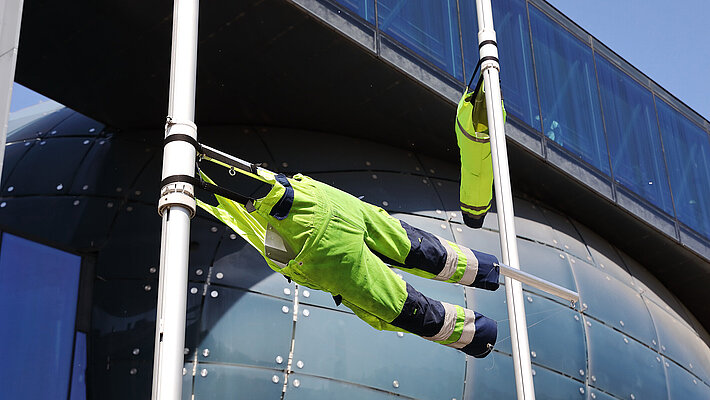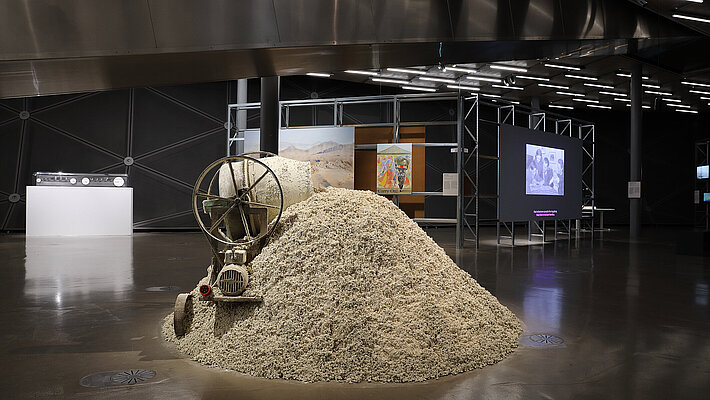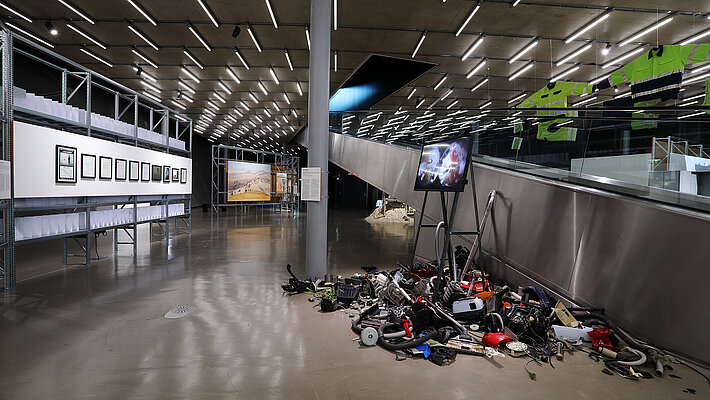|
|
|
|
|
|
Graz, 30.04.2024
In 2024, the Kunsthaus Graz will be focussing intensively on the topic of work. The complex challenges of today's world of work will be addressed in the exhibition 24/7: Work between the Creation of Meaning and the Dissolution of Boundaries, which will be on display until January 2025. The range of topics is reflected in 30 artistic works: invisible work, the expansion of the low-wage sector, advancing automation, inequality, work-life balance, digitalisation and globalisation and, last but not least, the precarious conditions under which artists work. The exhibition will continue to grow over the course of the exhibition and will be supplemented by new productions and performative projects.
|
|

24/7. Work between meaning and imbalance reflects the breadth of this spectrum of themes in 30 artworks tackling various aspects that both those working and those not working are confronted with in society today.
|
|
|
|
|
|
|
|
|
|
|
|
The world of work has undergone profound transformation in modern society. In the age of 24/7 access on offer, traditional working hours have long ceased to be the norm. The way ‘flexibility’ is understood has changed, even reversed. It is no longer the subject of negotiation for the benefit of both sides, rather a one-sided expectation of the employer.
Feminist perspective on inequality and exploitation
Despite – or precisely because of – the apparent freedom from rigid structures and time cards, many employees continue to struggle for fair conditions. Invisible work such as unpaid housework or care work, for the most part still carried out by women, is also a social problem at present, showing the need for feminist perspectives in the debate around work in order to address inequalities and exploitation.
With work increasingly precarious, and the low-wage sector expanding, the world of work is ever more differentiated by one area of well-paid and secure positions, and the other area with under-challenging, insecure, and existentially threatening labour conditions. Instead of coming closer to a classless society, a new class of ‘working poor’ has arisen.
Time is money
At the same time, such terms as New Work, 4-day week and work-life balance are the latest buzzwords. Are these mere empty phrases and feel-good topics of a digital bohemia? Or realistic demands in an age of maximum stress that all occupational groups can make and that will permanently change the dynamics between employers and employees? What effects does the prioritisation of the economy have on social policy, and to what extent is productivity linked to time? Is Benjamin Franklin’s famous maxim ‘time is money’ still valid today, when the widespread article of faith in our performance-based society – that we live in order to work – has increasingly begun to falter? And the reverse case, which initially appears attractive – that we work in order to live – means above all labour being reduced to an economic necessity.
Advancing mechanisation requires a new discourse
The changes in the working world that are shaping our present are complex and multi-layered. They reflect our adaptability and the ongoing search for balance in an ever-changing world. In a not-too-distant future, technologies such as artificial intelligence and automation will further transform the world of work, bringing new challenges that will again necessitate social and political discourse. Yet is work really on the brink of immateriality? Or is there not rather a danger, in the euphoria surrounding AI, of forgetting about that physical, mental and emotional labour that is connected to countless areas of our lives?
|
|

In the foreground is the work ‘Mischmaschine 2021/2024’ by Pia Mayrwöger. In her examination of various machines, Mayrwöger uses subtle humour to explore the interplay between humans and machines, changing production methods and work processes. Photo: Universalmuseum Joanneum/J.J. Kucek © bildrecht, Vienna 2024
|
|
|
|
|
|
|
|
|
|
|
|
30 artworks, new productions and performative art projects
The modern world of work is facing a wide range of complex challenges and discussions – from issues of inequality, mental health at the workplace and the reconciling of one’s professional and private life, to digitalisation, globalisation and climate change. 24/7. Work between meaning and imbalance reflects the breadth of this spectrum of themes in 30 artworks tackling various aspects that both those working and those not working are confronted with in society today.
One part of the exhibition space is available for new productions and performative art projects, which will allow the exhibition to grow as it runs. The artist Santiago Sierra, for example, will be putting on a two-day performance (1 May and 21 September) with two people with a migrant background entitled Repetition of the writing of a phrase (with the kind support of the ISOP association). The two-member artist group KURS will work in several phases on the Wall installation We have always received something in exchange that we lived, in which they approach the topic of work through the concept of laziness. On 14 June, British-Canadian media artist Sam Meech will use a knitting machine to produce a banner in his performance Punchcard Economy: 8 Hours Labour, which lasts an entire working day and addresses the great achievement of the labour struggle to limit the working day to eight hours. In addition to legendary works of art in the context of labour, such as Semiotics of the Kitchen by Martha Rosler from 1975, Harun Farocki's Workers Leaving the Factory from 1995 and Tehching Hsieh's One Year Performance, 1980-1981, in which the artist operated a time clock on the hour for a year, the exhibition will show new and adapted works by Mikhail Mikhailov, Luiza Margan and Aldo Giannotti.
|
|

A radical act of liberation by Selma Selman: the destruction of the hoovers - for most women a symbol of invisible, unpaid labour. (right) Photo: Universalmuseum Joanneum/J.J. Kucek
|
|
|
|
|
|
|
|
|
|
|
|
|
Parallel to the exhibition at the Kunsthaus Graz, the History Museum, in an exhibition titled It’s All Work, draws on historic press photographs from the Foto Blaschka agency to tell of the imbalance in the world of work and the massive inequalities between the sexes, some of which still existing today. A new artistic production based on the Blaschka Photo Archive will be on show in both exhibitions.
Exhibition artists:
Maja Bajević, Julien Berthier, Louisa Clement, Manuel Correa & Marina Otero Verzier, Jeremy Deller, Antje Ehmann & Harun Farocki, Aldo Giannotti, Liam Gillick, Lisa Großkopf, Andreas Gursky, Michael Hieslmair & Michael Zinganel & Theresa Hattinger, Tehching Hsieh, Johanna Kandl, Peter Kogler, KURS (Miloš Miletić, Mirjana Radovanović), Luiza Margan, Pia Mayrwöger, Sam Meech, Michail Michailov, Elisa Giardina Papa, Nika Radić, Martha Rosler, Sebastian Schmieg & Silvio Lorusso, Christoph Schwarz, Selma Selman, Santiago Sierra, Lia Sudermann & Simon Nagy, Oliver Walker.
_____________________
24/7
Work between meaning and imbalance
Opening: 30.04.2024, 7 pm
With a performance by slam poet Agnes Maier
Laufzeit: 01.05.2024‒19.01.2025
Curated by Katia Huemer
Location: Space02
Kunsthaus Graz, Lendkai 1, 8020 Graz
www.kunsthausgraz.at
Image material for download and the detailed press release can be found at
WORK WORK WORK
Event information for the ‘Day of Labour’
01.05.2024, 1-5 pm
Santiago Sierra Repetition of the Writing of a Phrase
People of migrant origin spend hours writing the phrase ‘I will never take a job away from a European’. Santiago Sierra's provocative performance addresses social and economic injustices such as the exploitation of migrant workers and breaks through social taboos to raise awareness of political and social grievances.
_____________________
We look forward to your coverage and will be happy to answer any questions you may have!
Daniela Teuschler
+43/664/8017 9214, daniela.teuschler@museum-joanneum.at
Stephanie Liebmann
+43/664/8017-9213, stephanie.liebmann@museum-joanneum.at
Eva Sappl
+43/699/1780-9002, eva.sappl@museum-joanneum.at
|
|
|
|
|
|
|
|